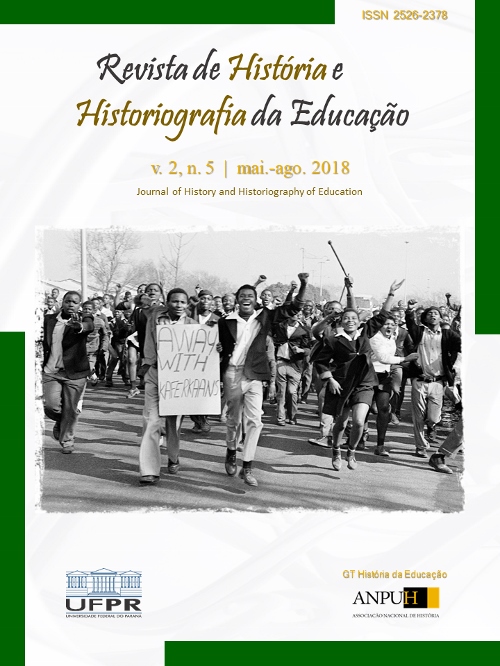Cultura escolar nos cadernos de um professor de escola rural (Corralito-MT, 1930 a 1960) / Presence of school culture in a teacher's notebooks of rural school (Corralito-MT, 1930-1960)
DOI:
https://doi.org/10.5380/rhhe.v2i5.57605Palavras-chave:
Cadernos, Cultura escolar, Era Vargas, História da educação brasileira / Notebooks, School culture, Vargas Era, History of Brazilian EducationResumo
Objetiva-se evidenciar a presença da cultura escolar pela análise de cinco cadernos que pertenceram ao Professor João Pantalhão Dourisboure, que lecionou entre as décadas de 1930 e 1960, na Escola Rural Corralito, sul de Mato Grosso. Os cadernos e demais fontes utilizadas pertencem a um acervo particular. Como referencial teórico, segue-se a perspectiva da cultura escolar, da cultura escrita e da história regional, ancoradas na Nova História Cultural. A análise permitiu evidenciar as dificuldades de acesso a materiais escolares, no contexto analisado, levando à confecção artesanal de cadernos a partir do aproveitamento de papéis diversos. Sobre o conteúdo escrito nos cadernos, destaca-se vestígios de características marcantes da Era Vargas, como a ênfase nos conteúdos de gramática da língua portuguesa, que suscita o cumprimento dos decretos de proibição por Getúlio Vargas de outra língua que não fosse a portuguesa, considerando-se especialmente a região de fronteira onde se localizava a Escola Corralito, fronteira como Paraguai. Outro vestígio foi a preocupação em reforçar a importância do trabalho, essencial para as relações sociais e a construção do país no período do Estado Novo. Destaca-se, por fim, a importância da conservação dessas fontes, que apresentam “testemunhos insubstituíveis” sobre as práticas escolares.
* * *
The objective of this study is to show the presence of the school culture through the analysis of five notebooks belonging to teacher João Pantalhão Dourisboure, who taught in the 1930s and 1960s at the Rural School Corralito, south of Mato Grosso, Brazil. The notebooks and other sources used belong to a particular collection. The theoretical reference is from the perspective of school culture, written culture and regional history, anchored in the New Cultural History. The analysis revealed the difficulties of access to school materials in the analyzed context, leading to the handmade making of notebooks from the use of diverse ways. On the contents written in the notebooks, there are traces of striking features of the Vargas Age, such as the emphasis on the grammar content of the Portuguese language, which provokes the compliance with the decrees of prohibition by Getúlio Vargas of another language that was not Portuguese, especially considering the border region where the Corralito School was located, near Paraguay. Another vestige was the concern to reinforce the importance of the work, essential for the social relations and the construction of the country in the period of Estado Novo in Brazil. Finally, the importance of conserving sources such as these, which present "irreplaceable testimony" about school practices.




